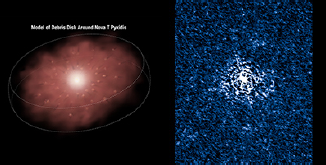Variable Stars Common Observation
Mission in Particular Areas of the Sky
HST Reveals Debris Disk Around T Pyxidis
 by Ivan Adamin in
July-August 2013 (#1)
by Ivan Adamin in
July-August 2013 (#1) T Pyx is a recurrent nova, erupting every 12 to 50 years and ejecting material that has formed the disk around the bright star. Hubble Space Telescope photographed T Pyx's latest outburst in April 2011, giving a rare look at stellar eruption in details.
The light echo after explosion in the double-star system reveals that material ejected by previous T Pyx outbursts is sticking around the star and form a debris disk. The study represents the first time the area around an erupting star has been mapped in three dimensions, researchers said. According to their measurements, the debris disk is about 1 light-year wide.

Debris disk around T Pyxidis star
Image Credit: NASA, ESA, A. Crotts, J. Sokoloski, and
H. Uthas (Columbia University), and
S. Lawrence (Hofstra University)

The erupting T Pyx star is a white dwarf, the burned-out core of a star much like our own sun. White dwarfs are small but dense objects. Imagine the mass of the sun packed into a volume the size of Earth.
The system is binary, hence has a companion star. The believed reason of the explosion is a high volume of hydrogen on the white dwarf's surface built up by accretion from a companion star. Typical outbursts increase T Pyx's brightness ten thousand times over a single day. Apart from the 2011 event, eruptions were registered in 1890, 1902, 1920, 1944, and 1966 The new HST observations also help refine the distance to the star: about 15600 light-years from Earth.
Free Bulletin on Variable Stars
Variable Stars Observer Bulletin is all about variable stars science. It's made by amateurs and for amateurs. Here simplified contemporary data about different aspects of variable stars research is published. The bulletin is scheduled for six issues per year.
Want to contribute an article? Feel free to contact us at:
http://www.vs-compas.belastro.net/bulletin-contribute
or please simply drop an email to [ivan dot adamin at gmail dot com]
 Issue #5
Issue #5
March-April 2014
Free Online
PDF Bulletin on Variable Stars
Amateurs' Guide to Variable Stars
Read Online as e-Magazine
In this issue:
 by Ivan Adamin
by Ivan Adamin
BL Bootis stars - anomalous Cepheids
 by Ivan Adamin
by Ivan Adamin
A revision of NSV 13538 = NSVS 17231162
 by Alexandr Ditkovsky
by Alexandr Ditkovsky
NSVS 11075037 = Dauban V53:
updated elements of a Mira variable in Hercules
 by Siarhey Hadon
by Siarhey Hadon
Pulsating variable stars and the Hertzsprung-Russell diagram
 by Siarhey Hadon, Ivan Adamin
by Siarhey Hadon, Ivan Adamin
RS Puppis: the light echoes calibrate standard candles for accurate distance measurements
 by Ivan Adamin
by Ivan Adamin
SS Lacertae: The non-eclipsing eclipsing binary
 by Ivan Adamin
by Ivan Adamin
>>View Full Contents

|
Statistics Overview
Variables by Type Variables by Magnitude Variables by Period Build Own Criteria |
